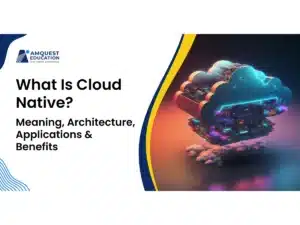Introduction
Large Language Models (LLMs) are fundamentally transforming software engineering. Beyond simple code completion, these advanced AI systems enable new paradigms such as intent-driven coding, autonomous code orchestration, and scalable AI-powered workflows. For AI practitioners, software architects, and technology leaders, mastering Agentic and Generative AI is essential to innovate effectively and stay competitive. This article explores the evolution of AI in software engineering, examines frameworks and deployment strategies, discusses best practices for responsible AI integration, and highlights real-world applications. It concludes with actionable insights and guidance on mastering these technologies through targeted education, including the comprehensive Amquest Education course on Software Engineering, Generative AI, and Agentic AI, one of the best Generative AI courses tailored for professionals in Mumbai.
The Evolution of Agentic and Generative AI in Software Engineering
AI’s role in software engineering has evolved from rule-based automation and static ML models focused on testing to powerful generative systems. Modern Generative AI models, such as OpenAI’s Codex and Anthropic’s Claude, trained on extensive codebases and natural language data, autonomously generate, refactor, and orchestrate code. Agentic AI extends this by enabling multi-agent workflows where AI agents coordinate complex tasks like planning architecture, generating tests, and integrating modules. This shift transforms developers from mere “code producers” into code curators and orchestrators, focusing on precise prompts and assembling AI-generated components. This intent-driven engineering approach prioritizes defining what software should achieve rather than manually coding how. Developers increasingly integrate LLMs as modular components within toolchains, accelerating cycles while demanding new skills in AI orchestration and prompt engineering. Recent advances such as reinforcement learning from human feedback (RLHF) and prompt tuning further enhance LLMs’ contextual understanding, making them indispensable collaborators. For professionals seeking the best Generative AI courses in Mumbai, understanding these foundations is critical.
Frameworks, Tools, and Deployment Strategies for LLM Integration
The AI software engineering ecosystem now includes sophisticated frameworks and tools facilitating scalable, reliable LLM integration:
- LLM Orchestration Platforms: LangChain, LlamaIndex, and emerging open-source projects enable developers to build dynamic pipelines connecting LLMs with APIs, databases, and workflows. These platforms manage prompt lifecycle, context retention, and multi-agent coordination, transforming static models into intelligent agents capable of complex reasoning.
- Autonomous Agent Architectures: Inspired by agentic AI principles, autonomous agents use LLMs to execute multi-step tasks with minimal supervision, such as generating test cases, debugging, or refactoring legacy code. These agents act as AI assistants embedded in CI/CD pipelines.
- MLOps Adapted for Generative AI: Deploying LLMs requires specialized MLOps practices addressing model size, prompt versioning, latency optimization, hallucination detection, and continuous updates. Tools like Weights & Biases and MLflow incorporate prompt performance tracking and quality automation.
- Security and Compliance Frameworks: AI-generated code’s interaction with sensitive systems necessitates automated vulnerability scanning, dependency analysis, and audit trails integrated into CI/CD workflows. Compliance with data privacy laws and ethical guidelines is enforced through policy-driven deployment and rigorous testing.
For those interested in Agentic AI course in Mumbai fees and offerings, Amquest Education provides modules covering these frameworks and deployment tactics in depth.
Advanced Tactics for Building Scalable and Reliable AI-Powered Software Systems
Scaling AI-powered software introduces unique challenges requiring sophisticated tactics:
- Modular AI Components: Designing LLMs as microservices with clear API contracts allows independent updates and fault isolation, enhancing resilience.
- Hybrid Human-AI Workflows: Combining AI automation with human expertise ensures quality control. Developers validate AI outputs, refine prompts, and manage edge cases, maintaining accountability and mitigating errors.
- Continuous Feedback Loops: Real-time monitoring and user feedback capture AI performance data, enabling iterative improvements and reducing errors.
- Robust Testing and Validation: AI-generated code requires specialized testing beyond unit tests, including security audits, ethical reviews, and AI-aware quality checks.
- Latency and Resource Optimization: Techniques such as model distillation, caching, and edge deployment minimize response times, ensuring smooth developer experience.
These tactics are essential for reliability, security, and performance as AI integration scales. Professionals evaluating best Generative AI courses in Mumbai should prioritize programs covering these advanced deployment strategies.
Adapting Software Engineering Best Practices for AI-Driven Development
AI tools introduce novel capabilities, but foundational software engineering principles remain vital, with adaptations:
- Code Quality and Maintainability: AI-generated code must conform to style guides, maintain modularity, and include documentation to support collaboration and maintenance.
- Security by Design: Developers must apply secure coding standards to AI-generated components, proactively scanning for injection vulnerabilities, insecure dependencies, or data leaks.
- Version Control and Traceability: Tracking AI-generated code with metadata about prompt versions and model parameters improves reproducibility and accountability.
- Ethical and Regulatory Compliance: Organizations must ensure AI usage aligns with legal requirements and ethical standards, including bias mitigation, transparency, and auditability.
Embedding these principles ensures AI augments rather than undermines engineering rigor and trust. For those interested in Agentic AI course in Mumbai fees, Amquest Education emphasizes these evolving best practices.
Navigating Ethical, Regulatory, and Governance Challenges
AI-generated code introduces new ethical and legal dimensions:
- Bias and Fairness: AI models trained on biased data can propagate inequities or unsafe coding patterns. Proactive bias detection and mitigation are critical.
- Data Privacy: Ensuring AI systems do not leak sensitive information through generated code or logs requires strict governance.
- Auditability and Explainability: Enterprises require transparent AI workflows with clear audit trails to satisfy compliance and build trust.
- Responsible AI Use Policies: Cross-functional governance teams define policies balancing innovation with risk management, including guidelines for human oversight and accountability.
Addressing these is essential for sustainable AI adoption. Professionals seeking best Generative AI courses in Mumbai will find detailed coverage of these topics crucial.
Cross-Functional Collaboration: A Cornerstone of AI Success
Effective AI deployment transcends silos, requiring collaboration among:
- Data Scientists and ML Engineers: Fine-tune models, optimize prompts, and interpret AI outputs.
- Product Managers and Business Stakeholders: Align AI initiatives with strategic goals.
- DevOps and Security Teams: Build secure, scalable deployment pipelines and monitor health.
- UX Designers: Craft interfaces supporting human-AI interaction, including feedback and explanations.
This ecosystem fosters shared ownership, accelerates innovation, and reduces risks. The Amquest course on Agentic AI in Mumbai fees includes modules on fostering such collaboration.
Measuring Impact: Analytics and Monitoring for AI in Software Engineering
Quantifying LLM impact requires multi-dimensional metrics:
- Developer Productivity: Reduced time-to-completion, increased code generation rates, faster issue resolution.
- Code Quality: Static analysis scores, defect densities, post-deployment bug rates.
- AI Output Accuracy: Hallucination frequency, error rates, successful task completion.
- User Satisfaction: Developer feedback on AI tool usefulness, trust, and integration smoothness.
- System Reliability: Uptime, latency, error rates of AI-powered services.
Integrating these into dashboards with alerts enables proactive issue detection and continuous workflow optimization. Professionals considering best Generative AI courses in Mumbai should look for training on these analytics techniques.
Case Study: GitHub Copilot, Elevating Developer Productivity Through AI Collaboration
GitHub Copilot, powered by OpenAI Codex, exemplifies LLMs’ transformative potential. Since its 2021 launch, Copilot has evolved into a deeply integrated AI pair programmer embedded in popular IDEs like VS Code.
Technical Highlights:
- Context-aware code completion supporting 12+ languages
- Automated test generation and documentation assistance
- Interactive chat for debugging and explanations
- Security scanning integration flagging vulnerabilities
Challenges and Lessons:
Early users noted risks of over-reliance and occasional insecure code. Continuous improvements via user feedback, model fine-tuning, and security tools have mitigated these issues.
Impact:
Studies show Copilot enhances productivity, shifting engineers toward higher-level design and intent-driven coding, validating the emerging paradigm.
Business Value:
Copilot boosts GitHub subscriptions and sets industry benchmarks for AI-assisted coding. This case underscores human-AI collaboration, continuous iteration, and embedding AI in workflows. Professionals exploring best Generative AI courses in Mumbai can gain insights from such real-world examples.
Actionable Insights for Mastering AI-Driven Software Engineering
- Adopt Intent-Driven Engineering: Define outcomes; use LLMs for syntactic and boilerplate coding to boost creativity and speed.
- Invest in Advanced Prompt Engineering: Craft precise, context-rich prompts maximizing AI relevance and accuracy.
- Integrate AI into CI/CD Pipelines: Automate testing, security checks, and deployment of AI-generated code for quality and compliance.
- Foster Cross-Disciplinary Collaboration: Build teams blending engineering, data science, security, and product expertise.
- Implement Continuous Monitoring and Feedback: Track AI performance and gather developer input for iterative improvements.
- Prioritize Security and Ethical Compliance: Apply vulnerability scanning and ethical guidelines rigorously.
- Upskill Your Teams: Equip developers and architects with training on Agentic AI, Generative AI, and orchestration frameworks.
For professionals seeking the best Generative AI courses in Mumbai or detailed knowledge about Agentic AI course in Mumbai fees, the Amquest Education course offers comprehensive, hands-on training. Its curriculum covers cutting-edge frameworks, deployment strategies, ethical considerations, and real-world case studies, empowering learners to lead AI-driven software engineering transformations confidently.
Frequently Asked Questions
Q: How are LLMs changing software engineers’ daily work?
LLMs automate routine tasks, generate boilerplate code, assist debugging, and enable focus on higher-level design and AI orchestration.
Q: What is intent-driven engineering?
A paradigm where developers specify what software should do, relying on AI for how, accelerating development and innovation.
Q: Can LLMs be trusted for production code?
While valuable, human review, automated testing, and security audits remain essential for reliability and safety.
Q: How can organizations scale AI-powered development?
By adopting modular AI services, hybrid human-AI workflows, continuous feedback loops, and robust generative AI MLOps.
Q: What skills do developers need for effective AI collaboration?
Prompt engineering, AI orchestration, understanding model limitations, and cross-functional teamwork.
Q: What distinguishes the Amquest course?
It offers deep, practical knowledge on Agentic AI, Generative AI, orchestration frameworks, deployment best practices, and ethical AI use, uniquely positioning learners to lead AI-enabled software engineering initiatives.
Conclusion
LLMs and Agentic AI are transforming software engineering, shifting developers toward intent-driven, higher-level problem-solving. Realizing their potential requires adopting new frameworks, best practices, collaboration, and managing risks and ethics. Investing in the right skills, tools, and processes accelerates innovation, improves code quality, and secures competitive advantage. For AI practitioners and software architects ready to lead this change, mastering software engineering and generative AI starts with comprehensive education such as the Amquest Education course on Software Engineering, Generative AI, and Agentic AI, recognized among the best Generative AI courses in Mumbai.
This article synthesizes insights from IBM AI research, industry experts, and empirical studies to provide an authoritative, actionable guide for AI and software engineering professionals.






